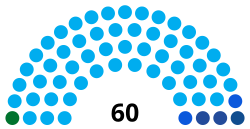Top Qs
Timeline
Chat
Perspective
Legislative Assembly of El Salvador
Government body of El Salvador From Wikipedia, the free encyclopedia
Remove ads
The Legislative Assembly (Spanish: Asamblea Legislativa) is the legislative branch of the government of El Salvador.
Remove ads
History
The organization was founded in 1824 as the Central American Congress (Spanish: Congreso Federal Centroamericano).[1] The 1824 constitution first established a bicameral legislature[2] , including Senate. The 1880 constitution retained a bicameral legislature. The 1886 constitution introduced a unicameral legislature.[2]
Structure

The Salvadoran legislature is a unicameral body. Until 2024, it was made up of 84 deputies, all of whom are elected by direct popular vote according to open-list proportional representation to serve three-year terms and are eligible for immediate re-election. Of these, 64 were elected in 14 multi-seat constituencies, corresponding to the country's 14 departments, which return between 3 and 16 deputies each. The remaining 20 deputies were selected on the basis of a single national constituency.
To be eligible for election to the assembly, candidates must be (Art. 126, Constitution):
- over 25;
- Salvadoran citizens by birth, born of at least one parent to be a Salvadoran citizen;
- of recognised honesty and education, and
- have not had the privilege of one's rights as a citizen cancelled in the previous five years.
On 1 June 2023, Salvadoran President Nayib Bukele issued a proposal to the Legislative Assembly to reduce the number of its seats from 84 to 60.[3] The proposal was passed by the Legislative Assembly on 7 June 2023 and went into effect on 1 May 2024.[4]
Remove ads
Current standing by party
Current leadership

The following table displays the Legislative Assembly's leadership, which were elected on 1 May 2024.[5]
Remove ads
Election results
Results
Remove ads
Other parliamentary bodies
El Salvador also returns 20 deputies to the supranational Central American Parliament, also elected according to open-list proportional representation from a single national constituency.
Members of the Legislative Assembly
Remove ads
See also
References
External links
Wikiwand - on
Seamless Wikipedia browsing. On steroids.
Remove ads




